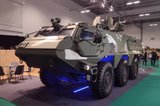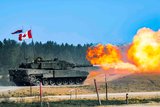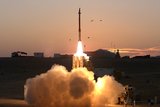Army-2021: VPK hopes new vehicles could fill Russian Ground Forces capability gaps
The Strela-VPK-KBM is a multipurpose vehicle intended to transport up to five passengers and cargo. (Photo: via author)
Russian vehicle manufacturer Military-Industrial Company (VPK) has unveiled two new designs at the Army-2021 exhibition – the unarmoured Strela-VPK-KBM and a multipurpose armoured amphibious vehicle.
The Strela-VPK-KBM is a multipurpose vehicle intended to transport up to five passengers and cargo. According VPK CEO Alexander Krasovitsky, the company developed the vehicle in cooperation with Bauman Moscow State Technical University (BMSTU).
Analysts see it as a future replacement for the venerable UAZ-469 light utility vehicle, although the variant revealed at Army-2021 is still in development. Strela-VPK-KBM is part of an experimental programme initiated by the Russian MoD, which includes four variants: light armoured, armoured amphibious,
Already have an account? Log in
Want to keep reading this article?
More from Land Warfare
-
![US DoD task force’s DroneHunter acquisition lays groundwork for Replicator 2 CUAS strategy]()
US DoD task force’s DroneHunter acquisition lays groundwork for Replicator 2 CUAS strategy
As the US Department of Defense looks to counter the growing threat of uncrewed aerial systems to improve homeland security, the DroneHunter acquisition could point to future commercial innovation.
-
![Norway opts for Hanwha’s Chunmoo for long-range fires under $2 billion deal]()
Norway opts for Hanwha’s Chunmoo for long-range fires under $2 billion deal
The selection of Hanwha’s K239 Chunmoo long-range precision fires system, with a contract expected to be signed on 30 January, makes Norway the second European country to choose the system. It is expected an operational system will be in service within four years.
-
![Layered protection: How air defence is adapting to rising drone and missile threats (podcast)]()
Layered protection: How air defence is adapting to rising drone and missile threats (podcast)
A surge in aerial threats – from advanced missiles to low-cost drones – is reshaping the way militaries approach air defence, driving demand for flexible, multi-layered solutions.























